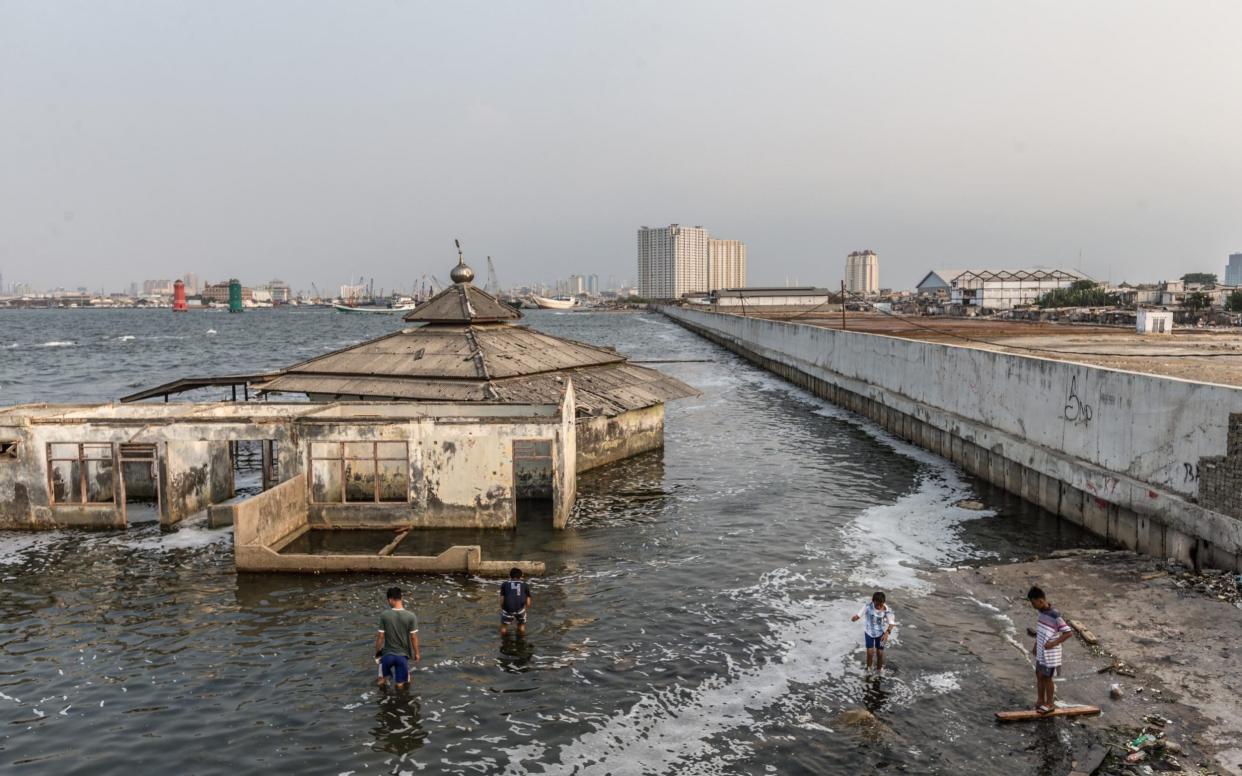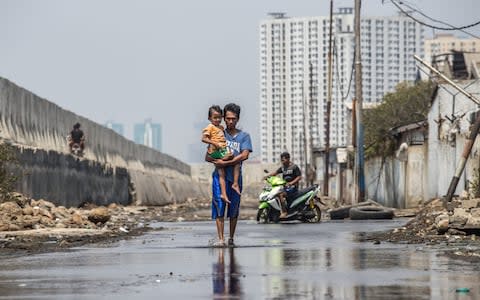Indonesia's government reveals location of new capital as Jakarta sinks

Udin Slamet now laughs when he recounts how he once had to lift his motorbike onto the roof of his home almost every day to protect it from the floods of Jakarta’s high tide.
But it was a time when his makeshift, one storey hut, constructed on wasteland by the waterfront was barely inhabitable and he struggled to eke out a living.
Located about 100 metres from the shore, in the sprawling slum of Muara Baru, in the north of the Indonesian capital, his home was routinely flooded before a towering sea wall was constructed in 2014. “The water would come up to my neck. I had to sleep at my neighbour’s,” he said.
Jakarta, home to some 10 million people, is rapidly sinking. Experts forecast that one third of the city could be entirely submerged by 2050 if urgent measures are not taken now.
A derelict mosque, which sits askew in the lapping waves on the other side of the wall serves as reminder of the consequences of what could befall the bustling area’s next generation.
The giant dike itself is an inadequate solution. About half a mile from Mr Slamet’s house, Dodi Riyanto, 35, lives with his wife and three children in the shadow of the sea barrier on a rundown street next to derelict warehouses and a slimy pool of stagnant water.

Cracks in the wall would leak once or twice a month, causing seawater to rush through his front door, he said. “When it does, I have to put all the electrical appliances onto a higher shelf.”
But the concrete structure had still offered him small win. “Before the wall the water came up to my hip. Now it’s just up to my knee,” he said. “It’s the risk of living in this area but I don’t have anywhere else to go.”
Jakarta’s subsidence has been caused by rampant construction and groundwater extraction, prompted by poor planning that has left some 40% of the city, mostly in the northern areas, without a piped water system.
According to Heri Andreas, an earth scientist at Indonesia’s Bandung Institute of Technology, in some parts of the north, the ground is already two to four metres below sea level. “Based on our measurement the city is sinking by one to 20 cm a year,” he said.
But subsidence is just one of the megacity’s formidable problems. Built in an earthquake zone on swamplands near the confluence of 13 rivers, the nation’s capital has been dogged by poor urban planning that has created insufferable traffic congestion and choking air pollution.

Now Joko Widodo, the president, who was elected for a second term in April, has taken the drastic step of sending city planners back to the drawing board to create a new capital from scratch.
On Monday Mr Widodo announced announced that the new location will be on the island of Borneo, 1,400km from outside Indonesia’s main island of Java which houses 57 percent of the country’s nearly 270 million people and enjoys the lion’s share - close to 60 percent - of the country’s GDP.
Last week Sofyan Djalil, the land planning minister, revealed that a 7,413 acre piece of land had already been earmarked in the province of East Kalimantan.
The Indonesian side of Borneo has five provinces, known for their rainforests, orangutans and coal reserves.
According to the ministry of national development planning (Bappenas), the ambitious move would require new government offices and homes to be ready for 1.5 million people - civil servants and their families - to start relocating by 2024, at a cost of about £27 billion,
In an interview, Rudy Prawiradinata, deputy minister for regional development, said the meticulous planning included studies of other countries who had recently moved their capitals – taking lessons from Canberra, Putrajaya in Malaysia, and particularly from Brazil’s switch from Rio de Janeiro to Brasilia.
“The economic impact was good in Brazil so I think this is a very good example for us,” he said, adding that “environmental issues” would be at the heart of the new city’s design.

But he stressed that the relocation of the capital was aimed more at a fairer distribution of development across the entire country than being viewed as one-stop solution to Jakarta’s problems.
“There are still disparities among provinces, even within provinces. Since the beginning of his government five years ago, the president already raised the issue of how to reduce disparities, not only among people from the poor to the richest but among regions,” he said.
Jakarta would still remain Indonesia’s financial centre, in a similar fashion to New York’s relationship with Washington DC, he said.
Mr Prawiradinata argued that Jakarta’s own chronic issues, including solutions for water scarcity, would be addressed separately.
But some experts fear Jakarta may end up being neglected. “By moving the capital you’re not going to solve the problems of Jakarta,” said Elisa Sutanudjaja, executive director at the Rujak Center for Urban Studies. “The ones that are really excited about moving the capital are the developers.”
Meanwhile, Mr Slamet remains optimistic about the future. The sea wall left his property dry enough to be able to open a small snack shop and business is booming.
“I don’t know, I don’t care,” he said when asked if he worries about Jakarta sinking. “It’s all in the hands of the Almighty.”

 Yahoo News
Yahoo News 
